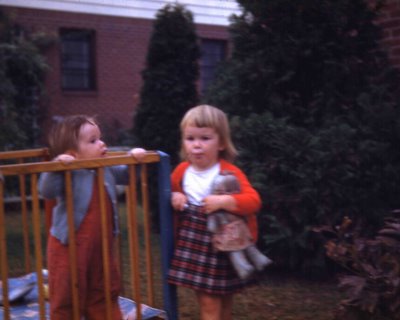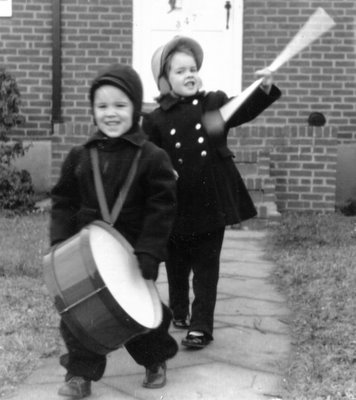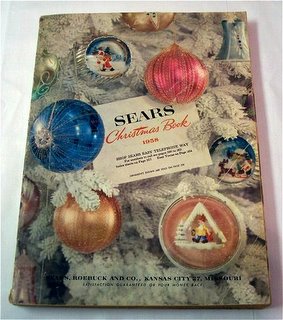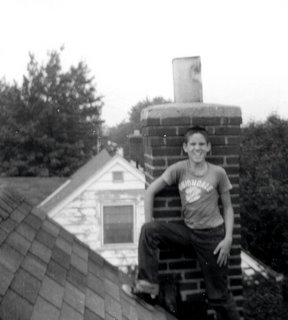April 11, 2004
MY SISTER, MARIE
She was one of the brightest stars of our generation, World War II bride, mother of six, grandmother of fifteen, community activist, teacher, founding pillar of St. Martha's Church in Uniondale, L.I., and finally, a volunteer lobbyist for the Alzheimer's Association in Albany and Washington.
She was my big sister. For us, her five brothers and her sister, Joan, she was always, "Marie".
In my first memory of her she is crying, doubtless frustrated by the antics of her three rambunctious younger brothers, Warren, Frank and Ken. We were eleven, thirteen and fifteen years younger than Marie.
Though she was an accomplished scholar at Our Lady of Wisdom Academy in Ozone Park, our father's death in 1939 made it impossible for her to consider college. She went to work, helping to support her widowed mother and five younger siblings. In the evening, she took courses, eventually overburdening herself and suffering some health setbacks.
A young man she dated in 1940 had a car with a rumble seat. Before we knew what cool meant, it was cool to go to the World's Fair in Flushing Meadow in the rumble seat of a coupe. The Trylon and Perisphere were enduring symbols of our youth. The young man did not survive the war which began for the U.S. in December, 1941.
At some point we learned tha Marie had met Joe Koch while on a summer vacation in the Adirondacks. Then he was in the Army and there were endless letters back and forth. Suddenly, he was coming home on furlough and she was to be married. It was March 6, 1944. She was just twenty-two. He called her Mary.
Joe Koch had four sisters, Mary, Jane, Agnes and Peggy. They descended upon our simple 220th Street home in Queens Village and transformed it into a wedding palace. As there was rationing, and meat was scarce, we younger ones were sent out to canvass the neighborhood for red coupons which, with a bit of money, and some luck, would provision the wedding feast. With certainty there were also preserved vegetables and fruits from our previous summer's victorygarden.
My memory is of a bright, sunny day with a distinct chill in the air. My brother Robert, 17, handsome in his blue Xavier uniform with white gloves, standing in for James who was aboard the USS Biloxi in the Pacific, escorted the beautiful bride down the aisle of SS. Joachim and Anne Church. Later, in our backyard, I recall seeing our white haired pastor, Father Herchenroder. He had been a poker playing pal of my father, and knew many of the Nolans from the Brooklyn days. As the celebration dwindled down, a few of us with more serious
purpose adjourned across the street to engage the Gallic boys in a game of marbles. Which reminds me that one of the Gallics, Denny, had a serious crush on my sister and would come calling for her. He was about ten at the time of her wedding.
As Joe went back to his military duties, Marie continued to live with us. We younger ones learned that the great mystery of life was unfolding, and that there was to be a baby in the summer of 1945. For some reason we had a piano in our living room. Maybe James played a little, and Aunt Anna some, but there were no virtuosos in our family. Soon my big sister, awaiting her first born, began to play over, and over and over again, "Meet me in St. Louis, Looie, meet me at the Fair", from the popular 1944 movie of that name. Hers was a
small repertoire. We never heard "The Trolley Song", "The Boy Next Door", or "Have Yourself a Merry Little Christmas" from the same film.
In May of 1945. Jim and Kay were married. At the reception in the Belmont Plaza hotel on Lexington Avenue, a family picture was taken. My very pregnant "big" sister hid behind her little brothers.
Mary Jo arrived on July 17, 1945. I believe by this time her Dad was in Europe, probably beginning his hunt for "Bambi" in Paris. And we had a little sister. Can boys thirteen, eleven and nine really be uncles? As I made my way through eighth grade at SS. Joachim and Anne in 1945-46, it was my morning ritual to spend time playing with Mary Jo before heading off to school. She was pretty cute.
When the war ended in August, 1945, Joe did not return as quickly as other soldiers. Most of his service had been stateside, and he had not accumulated as many points as others who had been in combat zones. When he did come home, he squeezed into our family abode at 220th Street, living there throughout 1946 and into 1947, commuting to his job wiith the Metropolitan Life Insurance Company in Manhattan via bus and subway.
Housing was scarce after the war. Early in 1947, Joe and Marie found a prewar Cape Cod style house in a place called Uniondale on the Nassau frontier. For us New York City sophisticates, anything east of Belmont Park was the habitat of potato farmers and clamdiggers. Both Joe and Marie began to exhibit some of those Long Island farming and gardening instincts, so it was great that they had purchased an oversized lot which brought them much happiness over the
years, and provided ample room for large family gatherings. The address was827 Henry Street.
We Nolans no longer owned a car so it was a two bus trip to Uniondale, first via Bee Line to Hempstead, and then by some Okielike conveyance along Front Street to Uniondale Avenue. I recall being pressed into service to scrape and paint the bathroom before they moved in. Looking out that bathroom window at night, you could see a few lights twinkling on far off Front Street. There seemed nothing in between. It was a pretty desolate place, but it was connected to civilization via telephone, IV6-5607. Over the years, I must have called
that number a thousand times.
By the early 1950s my three oldest siblings were contributing mightily to the postwar baby boom. Their progeny was color coded by family: blondes, brunettes and redheads. My wife Marie and I produced twins in the biggest baby boom year, 1957. With the marriages of Joan and Peter, Frank and Rosemarie, and Ken and Marie swelling the total, Mother soon had thirty-one grandchildren.
In the 1950s and 1960s our family celebrations were still focused on 220th Street. At Thanksgiving and Christmas, we would arrive in relays. It was on these occasions that James would put together family entertainments featuring the grandchildren. After Mother sold the old homestead in 1969 and moved to a Uniondale apartment, Joe and Marie began to host the family gatherings on the holidays and for special events during the summer. My sister had an amazing ability to bring together large numbers of people with little pretense or fuss,
creating a joyous, happy, relaxed time for all. These gatherings continued through the 1970s, 1980s and 1990s. Her organization of the 1998 one hundreth anniversary celebration of Mother's birthday topped all her parties and had to be held on the grounds of a local church to accomodate all the Nolans and related families. The one dotter, two dotter, three dotter terminology that we use to distinguish the generations was a product of that happy family event.
In the 1960s Marie graduated from Nassau Community College and continued on for her Hofstra degree. She told me that she was considering becoming an elementary teacher. With apology to all elementary teachers, I told my sister that she needed to be teaching at the secondary level. With her deep and diverse intellectual interests that was clearly the place for her. She went on to her master's degree at Hofstra University and began to teach social studies at Uniondale High School. Some years later, she invited me to speak to her colleagues at Uniondale on the subject of a school-within-a-school project they were organizing. I had done an evaluation of a similar community school at Herricks High School. It was hard to tell if she was more proud of me or I of her. It was amusing to see two of my Regis teachers, her Uniondale colleagues, in the group.
Mother was always amazed at having produced children who were so widely distributed across the political spectrum in their views. Marie, Frank and I were the liberal caucus, sometimes referred to as "Commonweal Catholics". I still read Commonweal, but now I stand alone, Have mercy, Ken.
In the late 1970s, the time came when Mother could no longer function on her own. Marie and Joe took her into their home. While carrying on an amazing variety of social, community and church related activities, Marie was able to provide our Mother with the best possible quality of life until her death in January, 1985. Perhaps it was her involvement in Mother's care that made her slow to recognize the changes that were taking place in her husband, Joe. He was
exhibiting symptoms later diagnosed as Alzheimer's disease, and so she entered upon another period of devoted care for a loved one, this time her life's partner.
From their earliest days in Uniondale, Marie and Joe had been part of the Catholic community which founded St. Martha's parish. Relations were not always smooth. There came a time when she was part of a group locking horns with the then pastor who wanted to knock down the old church and build something grander. Her group was successful. My sister was deeply involved in all aspects of her parish, serving as a lector and as a member of the parish council among
other activities. At various times of her life she was a daily communicant, walking the five or six blocks to the church. On the half-dozen or more occasions when my wife and I attended Mass with her there, she seemed to be greeted by half the congregation. As the community changed, St. Martha's served a more diverse population. Both in her church and community activities my sister was dedicated to maintaining Uniondale as a balanced, integrated community.
After Joe's death in 1987, Marie became a leader in the fight against Alzheimer's disease, serving as a member of the board of the Long Island Alzheimer's Association, conducting support groups, gathering her clan to participate in the annual march, and lobbying for funds each year in both Albany and Washington. Even after we moved from West Islip to Otisco Lake in 1994, she would summon us each fall to participate in the Alzheimer's march. My daughter Eileen remembers that about the time the cherry blossoms were blooming around the Tidal
Basin in Washington, her Aunt Marie would sweep into town to lobby for Congressional support to fund Alzheimer's research, bunk with her for one night, and share a meal at some ethnic restaurant with Eileen and my son Chris. Marie sensitized me to the Alzheimer's problem. Last summer I became a participant in a national study to determine the possible effectiveness of anti-inflammatory drugs in inpeding the progress of Alzheimer's disease.
About two years ago we took Marie to visit James at his home in Ridge. They sat opposite each other, holding hands. I do not recall any verbal communication between them, but who can know what is passing through the minds of a brother and sister who, after eighty years of shared family life, are meeting for the last time.
As her health declined Marie benefitted from the wonderful care given her by her family caregivers. Michael, Sherry and Willa live about forty minutes east of us so while my sister was with them we were able to visit her and see the loving care which they provided. Willa, about five at the time, was in a role reversal with her grandmother, watching over her and cautioning her when necessary.
My sister would often joke about a paper she had written at Hofstra, "I Lived with Twelve Men". She meant her five brothers, her five sons, her father and her husband. With Mary Jo's recent marriage, a thirteenth man came into my sister's life, Andy Graves. As Marie became less mobile, and less and less able to communicate, Andy and Mary Jo devoted all their energies to her care. All of us in her widely extended family are deeply grateful to them for their extraordinary efforts in caring for the person we all loved so much.
When we saw Marie two weeks ago at Jim's wake, we were elated at her response to Eileen's baby. Her eyes sparkled, and she seemed thrilled to see little Andrew, making the kind of cooing sounds adults use to communicate with infants. It gave us hope that she would be with us a while more, but it was not to be.
To Mary Jo and Richard, Stephen and Michael, Peter and Mark, let me say, in my brother Bob's words, your mother was an extraordinary woman. She was a teacher and model for us all, the exemplar of a modern, educated, Christian woman who was a great mother and grandmother, an accomplished professional educator, and a spirited activist and leader in the affairs of her church and community.
And to you, dear sister, your lively voice is quieted, and your exciting life's journey has come to an end. Leave it to you to pick Good Friday for a dramatic exit. You will live on in the hearts and minds of all of us who have loved you so dearly. Hopefully, you will light the way for us to follow in your heavenly path when we are called.
Love to all our family,
Warren
 I have always loved this picture of me and my brother Joe, 18 months younger, taken in the fall of 1948. This might have been the last time I had the advantage over Joe. I seem smugly satisfied by his captivity. In my baby book my mom claims that "Mary Jo and Joe were always ahead of mother. Often though she forgot he was so small and played rough." I am dubious; he does not look intimidated. Joe always pulled the wool over mom's eyes. She never knew that Joe's babysitting consisted of taking his brothers out on the roof and daring them to jump into the swimming pool.
I have always loved this picture of me and my brother Joe, 18 months younger, taken in the fall of 1948. This might have been the last time I had the advantage over Joe. I seem smugly satisfied by his captivity. In my baby book my mom claims that "Mary Jo and Joe were always ahead of mother. Often though she forgot he was so small and played rough." I am dubious; he does not look intimidated. Joe always pulled the wool over mom's eyes. She never knew that Joe's babysitting consisted of taking his brothers out on the roof and daring them to jump into the swimming pool. My mom and dad must have been dedicated to nurturing their children's unique gifts at whatever cost, so Santa was allowed to bring Joe a drum and me a baton. We lived in a tiny two bedroom, one bathroom, one-story house. Was Joe allowed to play the drum inside? This picture proves the falsity of Joe's accusation that I regularly beat him up. If I been a brother slayer, surely my mom and dad would not have trusted me with such an effective weapon. Richard obviously had not a fear in the world that my baton would come in contact with his head or his drum.
My mom and dad must have been dedicated to nurturing their children's unique gifts at whatever cost, so Santa was allowed to bring Joe a drum and me a baton. We lived in a tiny two bedroom, one bathroom, one-story house. Was Joe allowed to play the drum inside? This picture proves the falsity of Joe's accusation that I regularly beat him up. If I been a brother slayer, surely my mom and dad would not have trusted me with such an effective weapon. Richard obviously had not a fear in the world that my baton would come in contact with his head or his drum.















